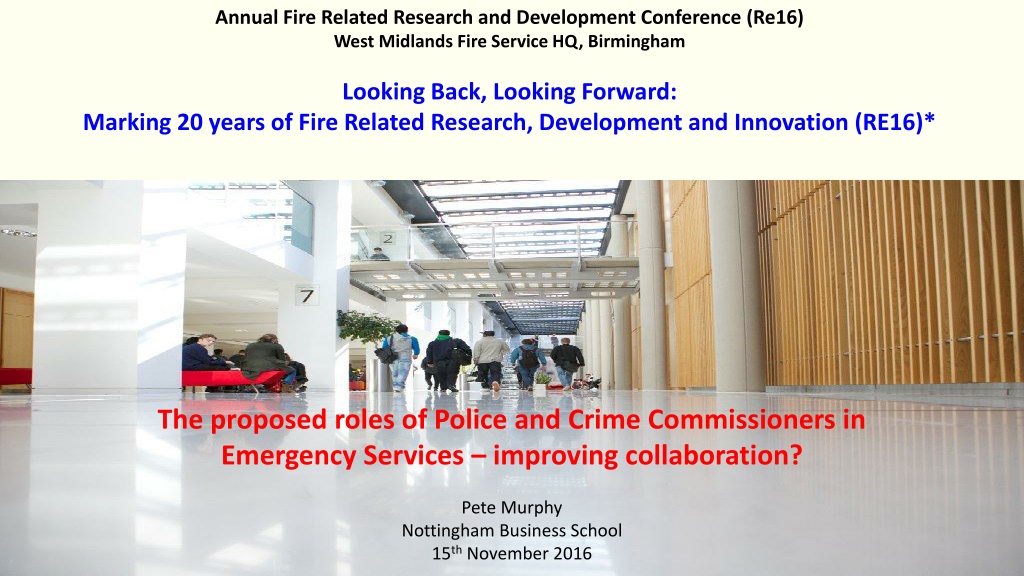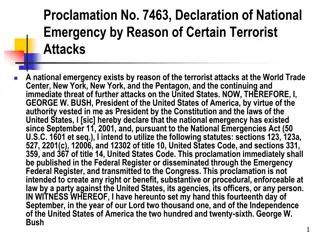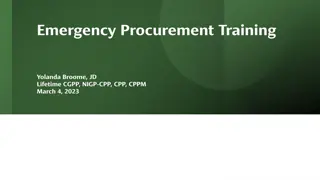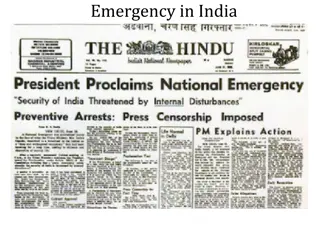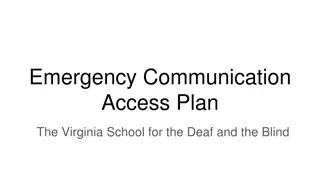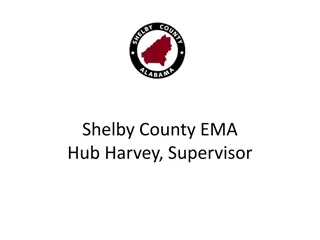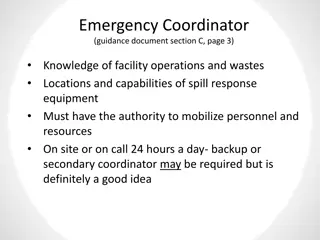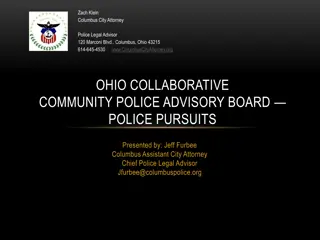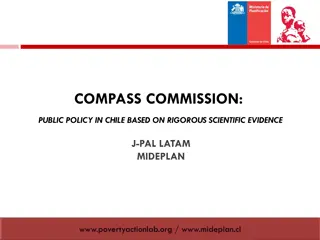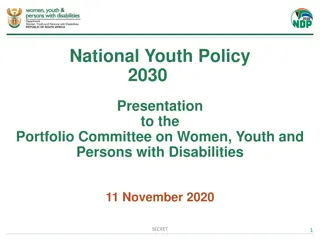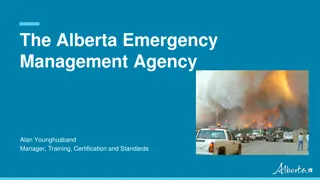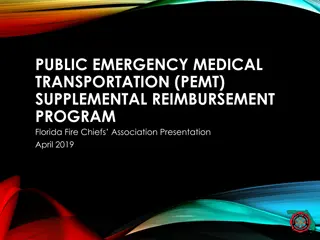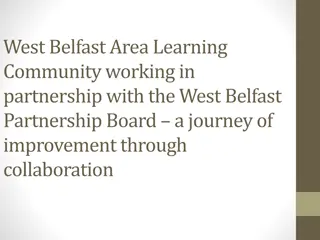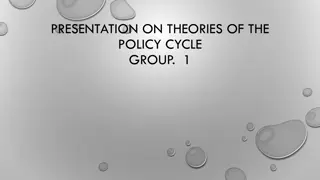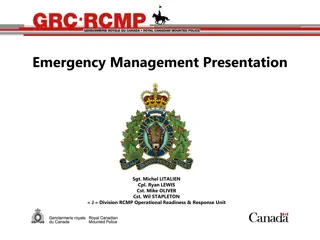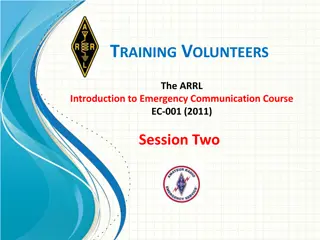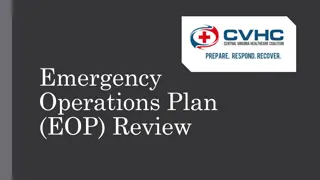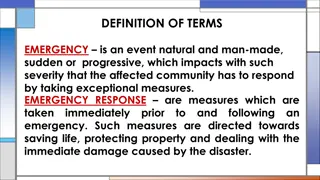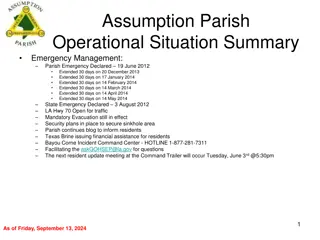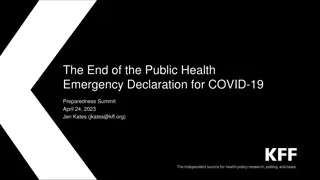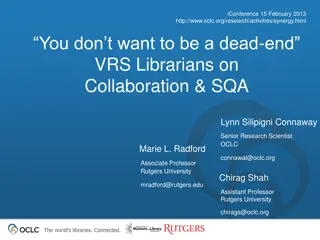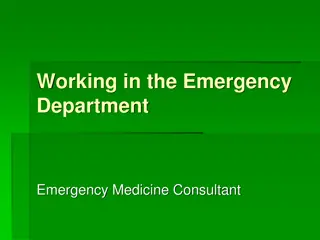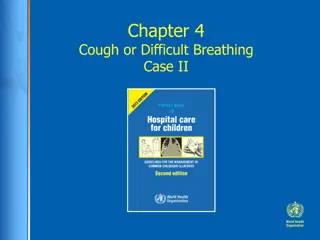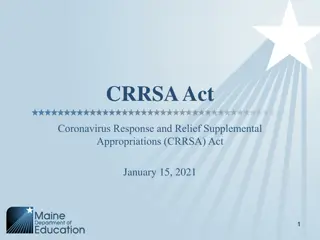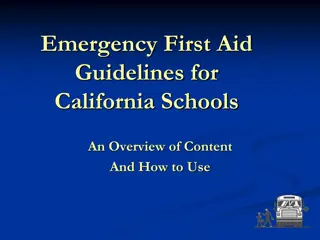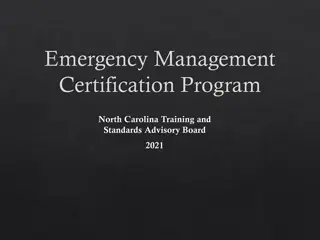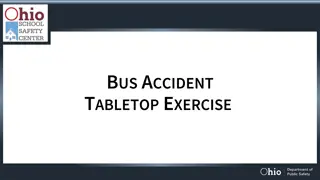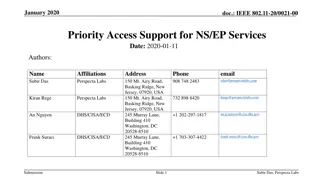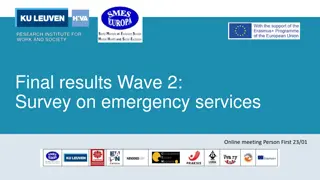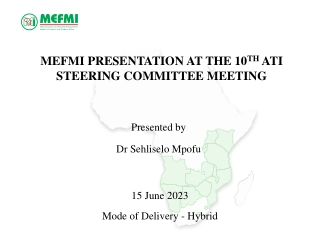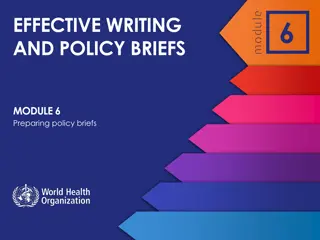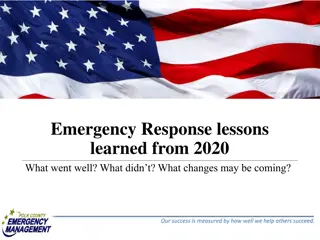Emergency Services Collaboration and Policy Development Overview
The journey of Emergency Services collaboration and policy development, focusing on the evolving roles of Police and Crime Commissioners (PCCs) in improving service delivery and accountability. Discussions include key milestones, such as the Conservative Party manifesto's initiatives, PCCs assuming responsibility for Fire and Rescue Services (FRS), and the emphasis on evidence-based decision-making in governance. Various reports and initiatives shed light on the continuous efforts to enhance efficiency, effectiveness, and public safety across Emergency Services.
Download Presentation

Please find below an Image/Link to download the presentation.
The content on the website is provided AS IS for your information and personal use only. It may not be sold, licensed, or shared on other websites without obtaining consent from the author. Download presentation by click this link. If you encounter any issues during the download, it is possible that the publisher has removed the file from their server.
E N D
Presentation Transcript
Annual Fire Related Research and Development Conference (Re16) West Midlands Fire Service HQ, Birmingham Looking Back, Looking Forward: Marking 20 years of Fire Related Research, Development and Innovation (RE16)* The proposed roles of Police and Crime Commissioners in Emergency Services improving collaboration? Pete Murphy Nottingham Business School 15th November 2016
Conservative Party Manifesto we will enable fire and police services to work more closely together and develop the role of our elected and accountable Police and Crime Commissioners Have we gone from policy based evidence making to Government by Fiat? (Funnell, W. 2001 Government by Fiat: The retreat from Responsibility. Sydney University of NSW Press)
Rapid policy development! summary to-date May 2013. Dissatisfaction with governance and performance of emergency services. PCCs could clarify accountability arrangements and ensure more direct visibility to the electorate (Sir Ken Knight 2013). Home Affairs Select Committee (2014) PCCs had provided greater clarity of leadership for policing in their area and were increasingly being recognised by the public for the strategic direction they are providing . Cross party political satisfaction with PCCs May 2015 Conservative Manifesto. September 2015 Enabling closer working between the Emergency Services consultation - 318 responses. January 2016 Government response - where it is in the interests of economy, efficiency and effectiveness or public safety, and where a local case is made they will be introduced. February 2016 Home Office Statement: There is now political consensus that PCCs are valuable and that they are here to stay - we will be legislating in . March and April 2016 informal ministerial briefings all PCC s will submit local cases for assuming responsibility for FRS. October/November 2016 Committee stages in House of Lords
Evidence and Literature (politics trumps evidence) Statistics Independent Crime Survey Fire National Statistics NHS Ambulance Statistics Recent Official Reports PAC (2011) Transforming the NHS ambulance Service Ken Knight Review (2013) Facing the Future College of Policing (2015) Estimating demand on the Police Service Home Office (2014) Police and Crime Commissioners: progress to date Emergency Services Collaborative Working Group (2014) National Overview of Collaboration Initiatives - projects and pilots Fire Transformation Fund Blue light Transformation Challenge Awards Collaborative programmes Emergency Services Mobile Communications Programme Joint Emergency Services Joint Interoperability Programme
Executive Summary of the Consultation Introducing a new duty on all three emergency services to actively consider collaboration opportunities with one another to improve efficiency and effectiveness; Enabling PCC to take on the duties and responsibilities of fire and rescue authorities, where a local case is made; Where a PCC on the responsibilities of a fire and rescue authority, enabling him or her to create a single employer for police and fire staff, facilitating the sharing of back office functions and streamlining management; In areas where a PCC has not become responsible for fire and rescue services, enabling them to have representation on their local fire and rescue authority; and Abolishing the London Fire and Emergency Planning Authority and giving the Mayor of London direct responsibility for the fire and rescue service in London, as will be the case in Greater Manchester.
New duty to collaborate Collaboration between emergency services is not as widespread or as wide-rangingas it could be in delivering efficiencies and better services There are limitations to innovation without a driver for change and there is significant scope for improving the way in which opportunities are identified and implemented Opportunities to collaborate should be kept under regular consideration hence a new duty to collaborate to improve efficiency and effectiveness (economy and public safety!)
Strengthening accountability and governance PCC take responsibility where it is in the interests of economy efficiency and effectiveness or public safety PCC adopts governance responsibility Business case and local consultation Transfer of FRS to PCC all authority agreement; public consultation; request for secondary legislation (same process for single employer) No agreement PCC submits business case to Home Secretary/DCLG (later may seek an independent assessment (HMIC CFRA) on which to base findings The secondary legislation would transfer governance and facilitate ambitious reform based on a cost-benefit analysis within the PCC business case.
Miscellaneous issues Boundary Issues 15 areas are not coterminous (tax) and future mergers Improving performance HMIC v Fire Peer Challenge and Operational Assessment Scrutiny expand Police and Crime panels increased levels of transparency (accountability?) Complaints depends if services remain separate or not deaths, coroners and the IPPC
Some Issues to think about Differences in organisational cultures , service objectives and operational practices of the services. The experience of National Offender Management System the prisons and probation what happened to probation? Fire policy repatriation back to the benign neglect of the Home Office! HRM issues (strikes and pensions as well as management and staff issues) have a habit of getting forgotten and derailing grandiose plans the case of the Irish Fire and Rescue re-organisation.
Governments response to consultation (politics trumps evidence) Overall they intend to expedite the main proposals, Ignore most of the practical issues around HR, equalities and complaints issues Leave some of the unresolved issues to the local business case process . .and others to any PCC pursuing new responsibilities. Health governance issues - realises you can t mandate Foundation Health Trusts (or for that matter FRAuthorities) to allow PCC on Board so PCC to ask the health bodies Local resilience issues encourages local resilience forums to look at how any governance changes (PCC, Metro Mayors etc) can enhance local resilience !
Response to consultation (cont) Having considered the consultation responses, in February the Government announced it intended to legislate (Policing and Crime Bill 2015-16) to: introduce a high level duty to collaborate on all three emergency services, to improve efficiency or effectiveness; enable authorities Police and Crime Commissioners (PCCs) to take on the functions of fire and rescue (FRAs), where a local case is made; where a PCC takes on the responsibilities of their local FRA, further enabling him or her to create a single employer for police and fire personnel; in areas where a PCC has not become responsible for fire and rescue services, enabling them to have representation on their local FRA with voting rights, where the local FRA agrees; and abolish the London Fire and Emergency Planning Authority and give the Mayor of London direct responsibility for the fire and rescue service in London. These measures will apply to England only.
Political Affiliations Political Affiliations (NHS trusts (NHS trusts neutral) neutral) Nottinghamshire Leicestershire Northamptonshire City Council - Labour City Council Labour (Elected Mayor) Northampton (District) - Labour County Council - Labour Leicestershire County Council Conservative Northamptonshire County Council - Conservative PCC - Labour Rutland County Council Independent PCC Conservative (standing down) Chair Fire Authority - Labour PCC - Independent Chair Fire Authority - Conservative Ex military (standing down) Chair Fire Authority - Conservative
An inconvenient issue - Tom Gash It is clear that the previous prime minister and chancellor see PCCs as an unappetising second-best solution for police accountability. The preferred model, long in place in London, is for a directly elected mayor to appoint a visible deputy to oversee the police and crime portfolios (although clearly not Boris). Greater Manchester has now adopted this model on an interim basis, although it will not be formalised until the first mayoral elections there in May 2017. Other city-regions likely to follow suit.
2016 PCC Election Candidates (party politics takes over) 27 Existing PCC re-stood 20 out of 27 were re-elected 40 Conservatives 40 Labour 34 UKIP 30 Liberal democrats 24 Independents 7 Greens 4 Paid Cymru (4 Welsh areas) 4 English Democrats 3 Zero Tolerance policing ex chief 11 Labour, (10 and 1) 10 Conservative, (7 and 3) 5 Independents (3 and 2) 1 Zero-Tolerance Policing ex chief (0 and 1) Turnout increased from 12% to 26%
2016 PCC election results - by political party Police and Crime Commissioners: Unloved but re-elected (BBC) Pre-election 16 Conservative 13 Labour 12 Independent Post-election 20 Conservative 15 Labour 3 Independent 2 Plaid Cymru
Accountability arrangements Pre and Post Police and Crime Commissioners (an inconvenient truth, while politics )
Home Secretary: Speech to REFORM Culture Pay Leadership/Accountability Governance Standards Information External assurance
6 components for the Local Business Case Analysis of local community needs. Strategic and operational appraisal of current and future deployment of the 3 blue light services Governance strategic oversight or full employer (and more powerful scrutiny?) Demonstrable value for money - Cost/benefit analysis; Financial Return on Investment (RoI) or Social RoI? Public engagement/consultation Independent validation and public assurance.
Latest News While May became PM and Brexit dominated the news the legislation and arrangements have quickly progressed. HMIC commissioned to scope an Independent Inspection regime CFOA.FSC/FIA unify research and development CFOA agreed to produce coherent and comprehensive professional standards Final House of Lords Committee Stage of the bill 9th November (Report Stage in House of lords due 23rd November). Meanwhile combined authorities and elected Mayors? We are now starting to see some PCCs and Fire Authorities locally taking the initiative
